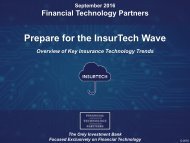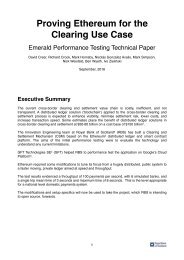Bitcoin and Cryptocurrency Technologies
1Qqc4BN
1Qqc4BN
Create successful ePaper yourself
Turn your PDF publications into a flip-book with our unique Google optimized e-Paper software.
of finding the next block, in the proportion 100 to 1. In the long term, Bob will find, on average, one<br />
percent of the number of blocks that Alice finds.<br />
We expect that miners will typically be somewhere close to the economic equilibrium in the sense<br />
that the expenditure that they incur in terms of hardware <strong>and</strong> electricity will be roughly equal to the<br />
rewards that they obtain. The reason is that if a miner is consistently making a loss, she will probably<br />
stop mining. On the other h<strong>and</strong>, <strong>and</strong> if mining is very profitable given typical hardware <strong>and</strong> electricity<br />
costs, then more mining hardware would enter the network. The increased hash rate would lead to an<br />
increase in the difficulty, <strong>and</strong> each miner’s expected reward would drop.<br />
This notion of distributed consensus permeates <strong>Bitcoin</strong> quite deeply. In a traditional currency,<br />
consensus does come into play to a certain limited extent. Specifically, there is a consensus process<br />
that determines the exchange rate of the currency. That is certainly true in <strong>Bitcoin</strong> as well; We need<br />
consensus around the value of <strong>Bitcoin</strong>. But in <strong>Bitcoin</strong>, additionally, we need consensus on the state of<br />
the ledger, which is what the block chain accomplishes. In other words, even the accounting of how<br />
many bitcoins you own is subject to consensus. When we say that Alice owns a certain amount or<br />
number of bitcoins, what we actually mean is that the <strong>Bitcoin</strong> peer‐to‐peer network, as recorded in<br />
the block chain, considers the sum total of all Alice’s addresses to own that number of bitcoins. That is<br />
ultimate nature of truth in <strong>Bitcoin</strong>: ownership of bitcoins is nothing more than other nodes agreeing<br />
that a given party owns those bitcoins.<br />
Finally, we need consensus about the rules of the system because occasionally, the rules of the<br />
system have to change. There are two types of changes to the rules of <strong>Bitcoin</strong>, known respectively as<br />
soft forks<strong>and</strong> hard forks. We’re going to defer this discussion of the differences to later chapters in<br />
which we will discuss them in detail.<br />
Getting a cryptocurrency off the ground. Another subtle concept is that of bootstrapping. There is a<br />
tricky interplay between three different ideas in <strong>Bitcoin</strong>: the security of the block chain, the health of<br />
the mining ecosystem, <strong>and</strong> the value of the currency. We obviously want the block chain to be secure<br />
for <strong>Bitcoin</strong> to be a viable currency. For the block chain to be secure, an adversary must not be able to<br />
overwhelm the consensus process. This in turn means that an adversary cannot create a lot of mining<br />
nodes <strong>and</strong> take over 50 percent or more of the new block creation.<br />
But when will that be true? A prerequisite is having a healthy mining ecosystem made up of largely<br />
honest, protocol‐following nodes. But what’s a prerequisite for that — when can we be sure that a lot<br />
of miners will put a lot of computing power into participating in this hash puzzle solving competition?<br />
Well, they’re only going to do that if the exchange rate of <strong>Bitcoin</strong> is pretty high because the rewards<br />
that they receive are denominated in <strong>Bitcoin</strong>s whereas their expenditure is in dollars. So the more the<br />
value of the currency goes up, the more incentivized these miners are going to be.<br />
But what ensures a high <strong>and</strong> stable value of the currency? That can only happen if users in general<br />
have trust in the security of the block chain. If they believe that the network could be overwhelmed at<br />
any moment by an attacker, then <strong>Bitcoin</strong> is not going to have a lot of value as a currency. So you have<br />
70









